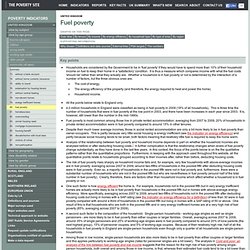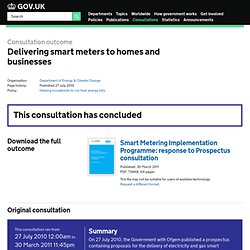

UK: fuel poverty - The Poverty Site. United Kingdom Key points Households are considered by the Government to be in 'fuel poverty' if they would have to spend more than 10% of their household income on fuel to keep their home in a 'satisfactory' condition.

It is thus a measure which compares income with what the fuel costs 'should be' rather than what they actually are. Whether a household is in fuel poverty or not is determined by the interaction of a number of factors, but the three obvious ones are: The cost of energy. EPRG-WP-1116_complete1.pdf (application/pdf Object) Smart Meters - Smarter Practices Document. EN_SmartGrids_Pilots_Report_2010.pdf (application/pdf Object) Empower-demand-report.pdf (application/pdf Object) MINDSPACE.pdf (application/pdf Object) 2175-emr-white-paper-exec-summary.pdf (application/pdf Object) Fuelling Transition: Prioritising resources for carbon emissions reduction. Smart Meter Case Studies. Smart Metering implementation programme: prospectus.
On 27 July 2010, the Government with Ofgem published a prospectus containing proposals for the delivery of electricity and gas smart metering in Great Britain.

This covered both domestic households and small and medium non-domestic sites. The prospectus document, which represented the joint views of the Department of Energy and Climate Change (DECC) and the Gas and Electricity Markets Authority (GEMA), set out proposals for and asked for views on how smart metering will be delivered. This consultation is now closed and the Government would like to thank respondents for their contributions. On 30 March 2011, the Government and Ofgem jointly published the Government’s Response to the Smart Meter prospectus.
It also describes the Government’s approach to updating consumer protections so they remain relevant for the smart world, including data access rules.